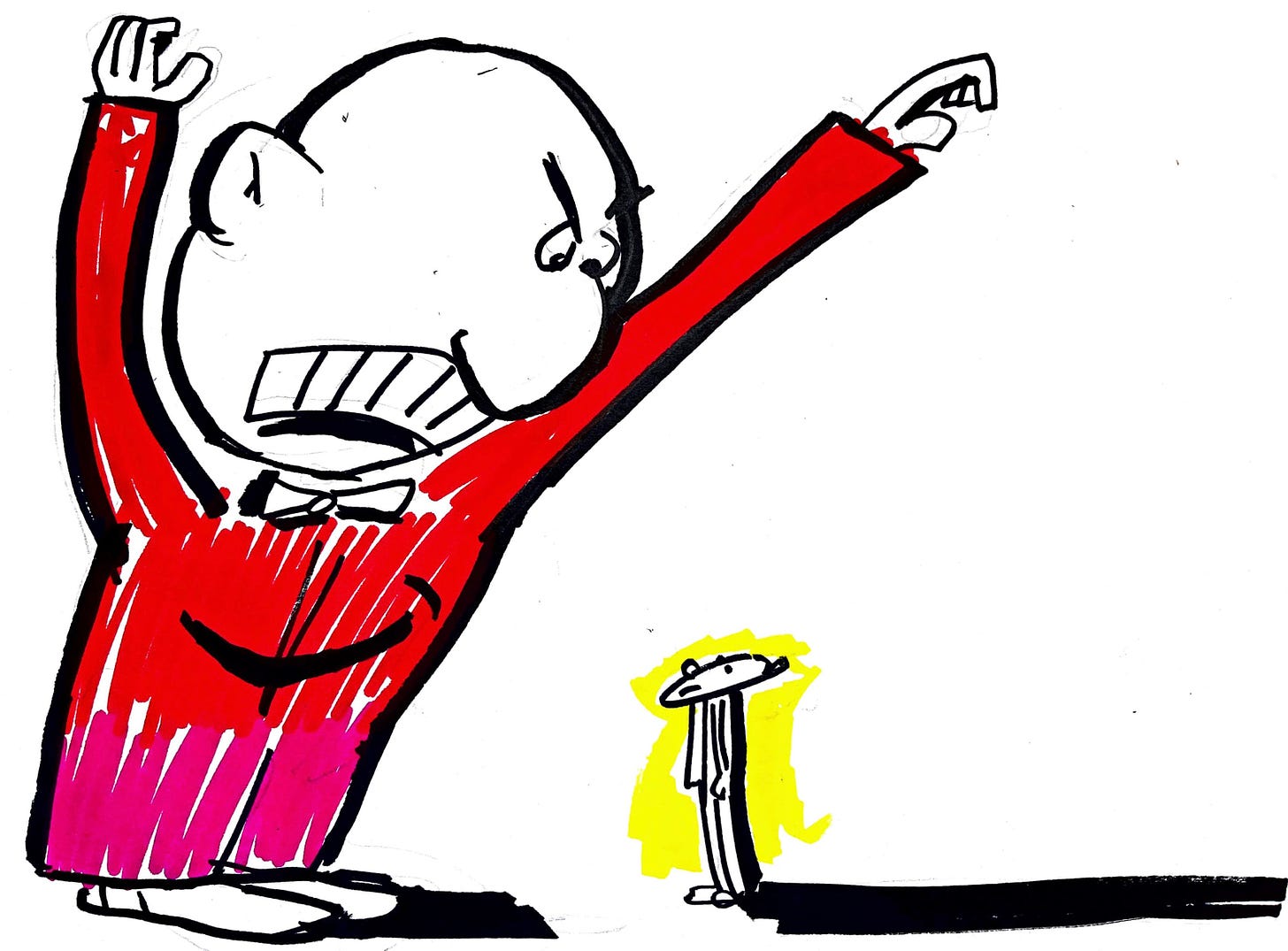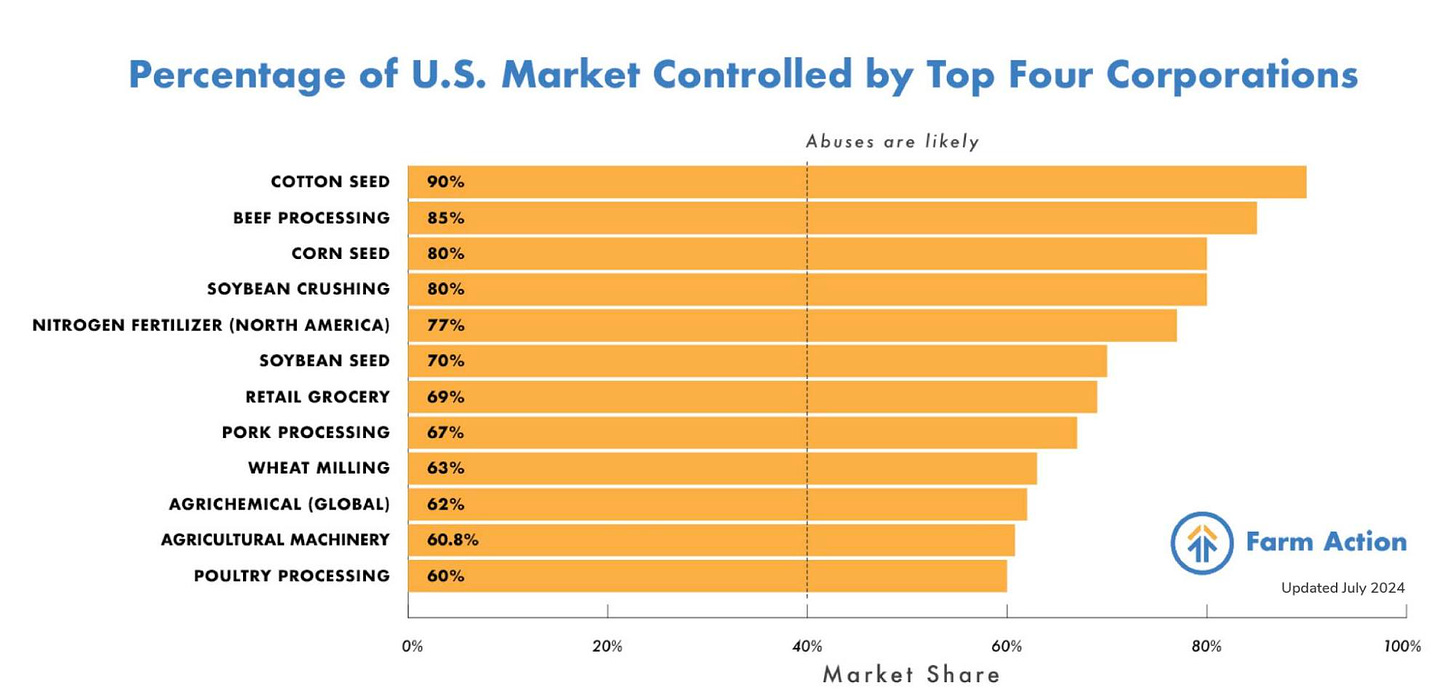Friends,
Kamala Harris is doing wonderfully well, but voters’ biggest concern continues to be the cost of living. In coming days, she’ll respond with her own economic plan.
I expect her to trumpet many of the important accomplishments of the Biden-Harris administration: cracking down on corporate rip-offs — including junk fees, price gouging, and shrinking packages to hide price increases; taking on Big Pharma to lower prescription drug costs and cap insulin at $35 a month; requiring banks to bring down overdraft fees from $35 to $4 and major airlines to eliminate family seating fees.
But I hope she goes further by saying how she’ll bring down the costs of food, fuel, and housing — the three biggest items in most consumers’ budgets, whose prices remain sky-high. And more generally, how she’ll attack the scourge of corporate concentration.
Let me suggest what she might do.
1. Food prices remain high because there’s little to no competition across the entire food supply chain. This has allowed big corporations to engage in a price gouging free-for-all.
Four companies control most food industries, allowing them to coordinate prices instead of compete on the basis of lower prices. Take a look:
Harris should announce that as president she’ll bust up food monopolies. She’ll give more resources to Lina Khan at the Federal Trade Commission and Jonathan Kanter, chief of the Antitrust Division of the Justice Department, to restore competitiveness in the food sector of our economy and thereby bring food prices down.
2. Fuel costs remain high because the energy sector is dominated by a handful of giant corporations that are keeping prices high. In 2019 (the most recent year for which we have good data), more than two-thirds of all energy was produced by six giant global corporations, which have been coordinating their pricing to maximize their profits.
In the two years following Russia’s invasion of Ukraine, oil giants Shell, BP, Exxon, Chevron, and Total made $281 billion and paid out over $200 billion to enrich their executives and shareholders rather than invest in renewables.
Market concentration has also given these few corporations (and their billionaire owners) unprecedented power and influence over our political institutions. Trump recently asked Big Oil for $1 billion in campaign donations, in return for which he’d get rid of environmental protections and incentives for renewables.
Harris should announce she’ll do the opposite. She’ll strengthen protections for the environment and expand incentives for renewables. She’ll also direct the FTC and the Antitrust Division of the Justice Department to take on energy monopolies to bring down fuel prices.
3. Rent is skyrocketing and homebuying is out of reach for millions partly because of Wall Street. Hedge funds and private equity firms have been buying up hundreds of thousands of homes that would otherwise be purchased by people.
Wall Street’s appetite for housing ramped up after the 2008 financial crisis. When the Street’s excessive greed created a housing bubble that burst, millions of people lost their homes to foreclosure.
The Street got bailed out and then began picking off the scraps of the housing market it had just destroyed, gobbling up foreclosed homes at fire-sale prices — which it then sold or rented for big profits.
Investor purchases hit their peak in 2022, accounting for around 28 percent of all home sales in America. If the present trend continues, by 2030, Wall Street investors may control 40 percent of U.S. single-family rental homes.
The lack of supply is the biggest reason home prices and rents have soared. Wall Street is worsening the supply problem.
Harris should announce her support of a bill now in both houses of Congress to ban hedge funds and private equity firms from buying or owning single-family homes. If it comes to her desk, she’ll sign it.
More generally, Harris should take on corporate concentration. Corporate profits are a bigger share of the economy than they’ve been in 75 years, while wages comprise the lowest share, due to the increase in corporate concentration. Workers and consumers have fewer options and have to accept the wages and prices these giant corporations offer.
Giant firms also provide significant campaign contributions and employ platoons of lobbyists and lawyers. The financial returns on their political investments are huge: They get tax loopholes, subsidies, bailouts, regulatory exemptions, and loan guarantees.
The sky-high profits at America’s biggest banks are due to their being too big to fail, along with their political power to keep regulators at bay.
High profits at the four remaining airlines come from inflated prices, overcrowded planes, overbooked flights, and weak unions.
High profits of Big Tech come from wanton invasions of personal privacy, the weaponizing of false information, and market power that’s discouraging innovation.
And so on.
The shift in bargaining power from workers to corporations and their shareholders has siphoned off a larger portion of national income into profits and left a lower portion in wages than at any time since World War II. Most of these profits are going into higher share prices — fueled by share buybacks — and higher executive pay rather than new investment.
Most of the increasing value of the stock market has come out of the pockets of American workers.*
America’s shift from farm to factory was accompanied by decades of bloody labor conflict. The shift from factory to office and other sedentary jobs created other social upheaval.
The more recent power shift from workers to large corporations and their shareholders — and consequentially, the dramatic widening of inequalities of income, wealth, and political power — has happened more quietly but has had an even more devastating consequence for the system: an angry working class vulnerable to demagogues peddling authoritarianism, racism, and xenophobia.
Kamala Harris and Tim Walz have an opportunity to restructure the American economy to benefit workers rather than big corporations, their executives, and major shareholders. I hope they take it.
*See Greenwald, Lettau, and Ludvigson, “How the Wealth Was Won: Factors Shares as Market Fundamentals,” National Bureau of Economic Research, Working Paper 25769, revised October 2023 at https://www.nber.org/papers/w25769.





Almost everything the Republicans are complaining about don't have any reflection on the current administration. The problems we face as a nation are world issues with no easy solutions. To blame Biden is asinine. Trump reminds me of a toddler whose mother just gave birth to the family's second child and now Donnie Boy is having a problem dealing with the new arrival. Attention deprivation would best describe the downturn in Trump's overall attitude concerning the upcoming election. He feels left out. Trump is in over his head because he has no defense against someone as smart as Kamala Harris. Considering Trump's VP pick he has good reason to worry. Vance is a socially regressive Southern religious nut job who is in dire need of finding Julie Newmar. Trump's fixation over crowd sizes gives a glimpse into the childish thinking of a man whose mental facilities are seriously in decline. When listening to him, if you can stomach the event, everything the man states is all about him. He has no policy to affect any positive change in this country. Trump's desire for reelection is nothing more than a sick power trip initiated to feed his insane ego. Face it, Trump isn't smart enough to be president of this country, ever.
All of the suggestions in this article are appropriate and good. But I would urge you to add another one: reforming the tax code toward making it a progressive one again. This would not have to be as strongly progressive as the one the US had in the 1950s but it should go partway back there. Bernie and Joe Biden feel that and have argued for it. Why shouldn't the Harris-Walz administration push for this? A lot of America's sickness as a society reflects its astonishing economic equalities. Let's try to reduce them and make the USA a far better place for its people.